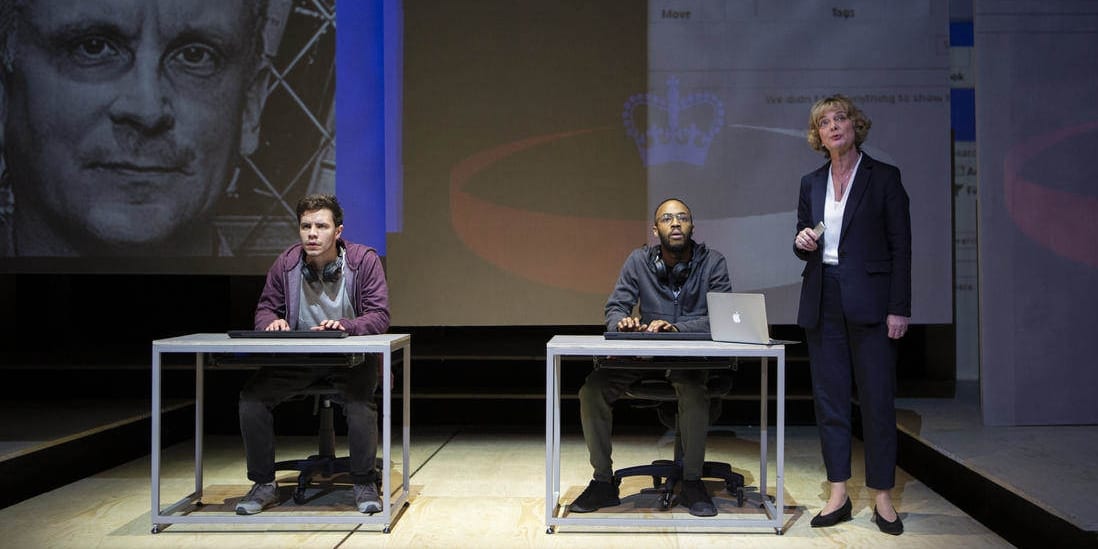The Haystack is the first full-length play written by Al Blyth and it is a gripping thriller about the conflict between investigative journalism and the surveillance state. It is given a brilliant high-tech production – as befits the subject matter – by Hampstead Theatre and the subject matter could not seem more relevant – involving terrorism, pervasive state surveillance, fake identity, and the involvement of foreign influences in national security. That the ending of the play is so bleak is no surprise but the message of the play is clear – democracy is under threat.
Neil and Zef are two junior members of staff at GCHQ. They are pulled off their normal duties to work in a Counter Terrorism task force to assist in identifying the sources that two journalists are using to write stories about problems at the Ministry of Defence. Neil begins to ask how this ranks as a terrorism issue but is immediately silenced. They complete this task so effectively that they are drawn into a covert surveillance operation aimed at verifying the nature of the link between a young journalist, Cora Preece, and a Saudi princess who seems to be her source. They do the groundwork but are then pulled off the case – the next thing they hear is that the princess has been found dead ‘by suicide’. It is difficult to say more about the plot without “spoiling” the twists and turns of the drama but it focuses around how Cora and Neil deal with the escalating dangers that surround them as they are sucked into the conflict around the deeply worrying powers that the state has to ignore our rights to privacy in the interests of protecting us from terrorism.
The central performances – of Rona Morrison as Cora and Oliver Johnstone as Neil –are top notch. Morrison paints an entirely convincing picture of an ambitious young journalist with a burning sense of justice but who becomes increasingly unstable as she gets out of her depth in the world of the story she stumbles across. Neil is the geek with increasing doubts about the real purposes of the surveillance technology that at first he has treated lightly as an extension of the video games that he and Zef use to relax. The relationship that develops between Neil and Cora is both touching and bizarre. The supporting roles are equally strong. Enyi Okoronkwo, as Zef, is by turns the game-playing geek and the “let’s not ask any difficult questions” young tech-wizard who sees promotion beckoning. Sarah Woodward, as their scary boss Hannah, is imperious – mind you, she does get the best one-liners “two pyjama-clad adolescents playing video games in a cupboard does not constitute a bloody task force”. Lucy Black, as Cora’s boss on the newspaper, strikes just the right note as the editor trying to manage a young colleague she clearly likes but who is heading off the rails.
The production in the hands of Hampstead’s artistic director, Roxana Silbert, is excellent. Too often, video projection and high-tech effects get in the way of storytelling when in the hands of directors who get carried away by the machinery and forget the trajectory of the story they are telling… not here – the subject matter and the technology are so well matched. If I have reservation it is that the writer, Al Blyth – who shows real talent for dialogue and plot – doesn’t give himself room to allow for real examination of the underlying ethical issues. This is clearly a play that asks its audience to think about the balance between personal privacy and public safety, but these issues really only emerge in the brief disagreements between Hannah, Neil and Zef. Yet the central feature of the plot of The Haystack is about bribery and corruption, not terrorism.
Contemporary thrillers that are both gripping in their storytelling and have something important to say are a real treat in the theatre and, with fine acting and sharp direction, this play means that Hampstead have a hit on their hands.

